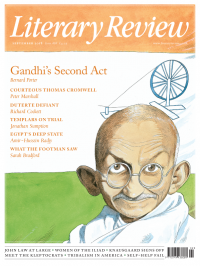David Gelber
Slaves to History
Brazil: A Biography
By Lilia Moritz Schwarcz & Heloisa Maria Murgel Starling
Allen Lane 760pp £30
When is a country born? For the biographer of a mere mortal, a date of birth is a simple matter of fact, or, at worst, an extrapolation. But when the biographer’s subject is an entire land, it is a trickier matter. The origins of some countries are lost in the mists of time. For others, the pall of mythology is so heavy that no amount of tugging will yield an answer. Then there is the question of what to take as the moment of birth: date of independence, first stirrings of political life, earliest settlement by Homo sapiens, perhaps even the separation of the continents?
In the case of Brazil, Lilia Moritz Schwarcz and Heloisa Maria Murgel Starling plump for 1500, the year in which Pedro Alvares Cabral, commander of a Portuguese fleet bound for India, veered off course and struck the eastern flank of South America. It’s a conservative choice for two authors who flaunt their progressive credentials. Schwarcz and Starling do acknowledge the millennia of human settlement preceding colonisation, but only as an ordinary biographer might open with an ancestral table. This book, first published in Brazil in 2015, is very much a history of the land since – to use an old-fashioned term – its discovery.
Brazil in 1500 was barely a thing. It was several centuries before the contours of the modern country became properly discernible. The name ‘Brazil’, as the authors make clear, first appeared about a dozen years after the Portuguese arrived, taken from that of a tree, common along the

Sign Up to our newsletter
Receive free articles, highlights from the archive, news, details of prizes, and much more.@Lit_Review
Follow Literary Review on Twitter
Twitter Feed
Under its longest-serving editor, Graydon Carter, Vanity Fair was that rare thing – a New York society magazine that published serious journalism.
@PeterPeteryork looks at what Carter got right.
Peter York - Deluxe Editions
Peter York: Deluxe Editions - When the Going Was Good: An Editor’s Adventures During the Last Golden Age of Magazines by Graydon Carter
literaryreview.co.uk
Henry James returned to America in 1904 with three objectives: to see his brother William, to deliver a series of lectures on Balzac, and to gather material for a pair of books about modern America.
Peter Rose follows James out west.
Peter Rose - The Restless Analyst
Peter Rose: The Restless Analyst - Henry James Comes Home: Rediscovering America in the Gilded Age by Peter Brooks...
literaryreview.co.uk
Vladimir Putin served his apprenticeship in the KGB toward the end of the Cold War, a period during which Western societies were infiltrated by so-called 'illegals'.
Piers Brendon examines how the culture of Soviet spycraft shaped his thinking.
Piers Brendon - Tinker, Tailor, Sleeper, Troll
Piers Brendon: Tinker, Tailor, Sleeper, Troll - The Illegals: Russia’s Most Audacious Spies and the Plot to Infiltrate the West by Shaun Walker
literaryreview.co.uk